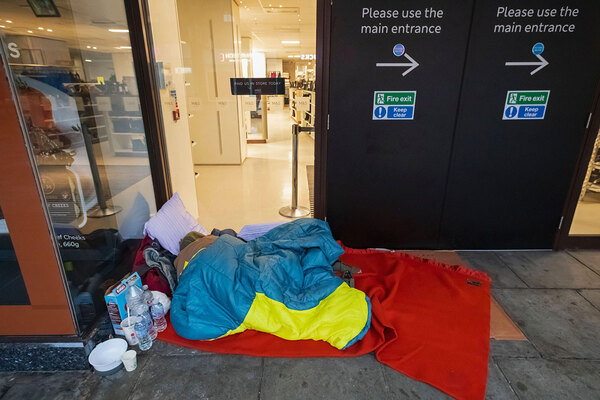You are viewing 1 of your 1 free articles
 Jules Birch
Jules BirchWhich party will do best at improving housing for the poorest?
As polling day approaches, Jules Birch uses results of an academic study to look at which party is likely to help those in housing poverty
 Jules Birch
Jules BirchThe answer ranges from something to not much at all, according to a study of their manifestos launched by a group of experts this week.
Academics Stand Against Poverty conducted a poverty audit of the Conservative, Labour and Liberal Democrat policies on everything from disability to international development and education to health. Each of these was marked out of five, with five representing very high confidence that the policies on offer would tackle poverty and one representing very low confidence.
Labour came out best overall with an average score of 3.6, including five for its plans for disability and four for other areas including health, education and social security.
“All three parties are concerned about affordability but none seem to be focusing on the poorest households.”
The Liberal Democrats came a close second with 3.2, matching Labour on education and ranked as the best party on the environment and sustainability.
The Conservatives scored worst on every topic, with no individual mark higher than two and an overall mark of 1.5.
That represents a significant improvement for Labour on its score in 2015, when more parties were assessed. Back then the Greens led the way with 3.9, followed by the Liberal Democrats with 3.2, Labour in third place with 2.6, the Conservatives in fourth place with 1.7, and UKIP trailing in last with 1.4.
Looking at housing specifically in the 2017 audit, Labour leads with three, followed by the Liberal Democrats with two and the Tories with one. That mostly applies to England given that housing policy is largely devolved, but the combined score of six out of 15 is the lowest for the 11 different policy areas assessed.
The housing section of the audit was conducted by Becky Tunstall from the University of York. Her blunt conclusion was: “If the UK housing system is ‘dysfunctional’ and in ‘crisis’ on election day, none of these three manifestos suggest it will be working much better by the end of the next government, and poorer people will continue to take the brunt of problems.”
None of the parties offers a clear strategic view of the changing housing system, she said.
They all want to stop the decline of homeownership but don’t say by how much or for whom or at what cost.
All of them want to expand housebuilding but “none of the pledges are fully credible without more details setting out how the new homes would be planned, delivered and paid for”.
All of them want to extend the standard private rented tenancy to three years but it is not clear whether that will be enough to offer suitable tenancies for families with children in school.
She added: “None of the manifestos considers whether greater rights for tenants will mean more reluctance of people to rent homes out, or higher rents, or how the enforcement of higher standards will be paid for.”
All three parties are concerned about affordability but none seem to be focusing on the poorest households. Fuel poverty is mentioned but none of them consider the plight of the ‘housing poor’ – people whose housing costs leave them in poverty.
“Housing has been less prominent as an issue this time than it was in 2015.”
None of the manifestos comment on the fact that the capital investment budget for housing is less than half what it was in 2010 or say if this ‘new normal’ will be enough to fix the problems.
On benefits, the audit notes that Labour and the Liberal Democrats would repeal the bedroom tax and restore housing benefit to the under-22s but leave alone many other cuts to housing benefit that would be more costly to change.
The Conservatives are the only party to mention social class. However, the audit says their manifesto may help working class people who can afford to use the Right to Buy or Help to Buy but does not help those who are “just about managing” and worried about paying their mortgage, or social tenants or private tenants who wish they were in social housing.
All three parties pledge to end street homelessness and propose using Housing First to help people get off the streets and into independent accommodation. “None explain how the necessary one-bedroom flats will be found or funded,” said Ms Tunstall.
The three parties would inevitably challenge aspects of the assessment. Labour might point to more ambitious spending plans or the extra detail it published on Monday on new deals for first-time buyers, private renters and people on the waiting list.
In particular, its pledge to extend the Help to Buy equity loan scheme will be focused on first-time buyers on “ordinary incomes”. The plan to offer them 100,000 homes linked to local incomes sounds a bit like the original (and better) version of Starter Homes.
The Liberal Democrats might point to other proposals in their manifesto such as a 300,000 a year target for new homes. They could also highlight the fact that the Institute for Fiscal Studies concluded that they would do more than Labour to reverse benefit cuts.
The Conservatives might challenge their score for a manifesto that promises more social housing. Even though that is not quite what it seems, this contrasts with 2015 pledges to extend the Right to Buy and force councils to sell vacant homes to pay for it.
But as the election campaign enters its final days, this audit is a sobering reminder of the reality of the housing crisis – or crises – that all the parties are committed to tackling in their rhetoric. It’s one thing to promise more homes and help for first-time buyers, but quite another to deliver policies that benefit everyone, including people in poverty.
Housing has been less prominent as an issue this time than it was in 2015. There are obvious reasons for that, but it was still noticeable that there was not a single housing question in last week’s three big TV debates and Question Time sessions.
Whoever wins on Thursday will need some answers.
Jules Birch is an award-winning blogger who writes pieces exclusively for Inside Housing.









